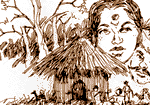


|
|
 |
| HOME | TRAVEL | TRAVELOG | ||

A Village called Wadi ... in the backwoods of Maharashtra V S Srinivasan Wadi was the name of the village. And wadi, in Marathi, also happens to mean a village. Located in the heart of the Raigad district, Maharasthra, miles away from 'civilisation', we had stumbled on this obscure Thakar village while conducting a survey on literacy in this area. Thakars are a community that rely on the jungle for survival. They first shot into public eye in a Marathi documentary, starring Smita Patil, called Jaitreya Jaite. "Amhi thakar, thakar, thakar. Ya ranachi pakhar pakhar!" goes a hummable number from the film that compared them -- a trifle romantically perhaps -- to butterflies in the jungle. These people once lived only on the fruit of the jungle, plucking berries and bhakars for subsistence. Not anymore. Now, as we approach the village stumbling over a steep path, we notice lines running across the sides of the valley, a legacy of the terrace farming practised on the hills. It had taken us one-and-a-half hours to trek here from the Bombay-Goa highway, south-east of Panvel. Up front is a big mountain, which was also pictured in the film. Below, the countryside is lush green, speckled with the tiny brown blobs that marked the dwellings of the Thakars. These houses are made of wooden sticks plastered with mud. There are no doors. As we drew closer to the hamlet, the villagers -- consisting essentially of women and the aged -- drew together in small clusters, watching as these foreigners came down to them, deaf to the children clamouring for attention. The men were out in the fields and were expected back shortly, we were told. We started quizzing them about literacy, hoping to spend a few hours chatting with these folks and discovering what their village was all about. There was one old lady who seemed especially eager to talk. She spoke a dialect of Marathi a little bit different from what one normally hears. "I have seven sons," she said proudly. "We need a lot of people to work in the fields. If there are seven men out there we get better income and we'll be able to eat and drink more." Drinking is not the prerogative of the men alone. The women join the men for drink. In fact, when a baby is born a measure of liquor is poured into its mouth. And liquor -- not the waters of the Ganga, as elsewhere in the country -- is poured down a dying man's throat. The woman tells us that during one of those Bacchanalian bouts that affected the village, her youngest son had ended up marrying one of the village belles. "Tho gharat ghusli (She forced herself into the house)", she complains. As we sat talking to her inside her hut, a cow strolled in. She lived here too, the lady explained. "Everyone is part of the home here." Even the despicable daughter-in-law. There was nothing in the hut other two vessels and few meagre possessions. No electricity. No radio. Not even a stove to cook on. Yet they insisted on feeding us. The few vegetarians among us were fed big rotis made from bhakars. Those willing to clamp teeth on meat were served a delicious dish that was polished off in no time. Later, they asked her what the gourmet item was. Tho ranti undhir aahe(That was a jungle rat), she said. By evening the men came down from the fields. And we got down to some serious work, starting of with some general knowledge queries. "Who is our prime minister?" asked my colleague. Pat came the reply, "Kalu Ram!" Kalu Ram was the village chieftain. A little more prodding revealed they did not know what a prime minister was, leave alone understanding the concept of democratic governance. In their little village, an isolated land-locked island in the middle of Raigad district, leadership and power were unknown entities What was their definition of India, we wondered? Did they know about our Independence and freedom? "Yes we know when we got freedom. That was around 30 to 35 years ago." Something must be wrong with their mathematics, we thought. Wasn't it the 50th year of Independence? No, the freedom they were discussing was when they revolted, locked the local zamindar in his house and burnt him alive. This zamindar had stolen all their land and cattle and murdering him had been the only way out, they said. In appearance the tribals were dark, well-built, hardy. And aggressive. Living in the jungle, one supposes, had given them their current rather rough outlook of life. That could also explain their peculiar dependence on alcohol and the refusal to consider the future. Whatever is earned in a day is spent on liquor. There is even one villager given the responsibility of keeping the village well stocked with liquor. He goes to the city every so often to replenish stocks. Hardly any visitor comes into Wadi other than vote-seekers at election time and the occasional army patrol coming in to purchase goats probably intended for the canteen. Kalu Ram indignantly explained how one such armyman had tried to "bribe" him. "We sold them 400 goats for Rs 400 apiece. That makes Rs 16,000. They were asking us to take Rs 20,000. Why should I take Rs 4,000 extra? We are poor farmers. We don't need all that," he asked. And what did they do with the money? Surprise! "Videshi pyali. (We drank foreign liquor that day)," he grins. By midnight, he says, the entire community was drunk and the Rs 16,000 was all spent. "Who know if we will ever live to see tomorrow." How true. Sketch by Dominic Xavier
|
|
|
|
|
|
|
|
|
HOME |
NEWS |
BUSINESS |
CRICKET |
MOVIES |
CHAT
INFOTECH | TRAVEL | LIFE/STYLE | FREEDOM | FEEDBACK |
|